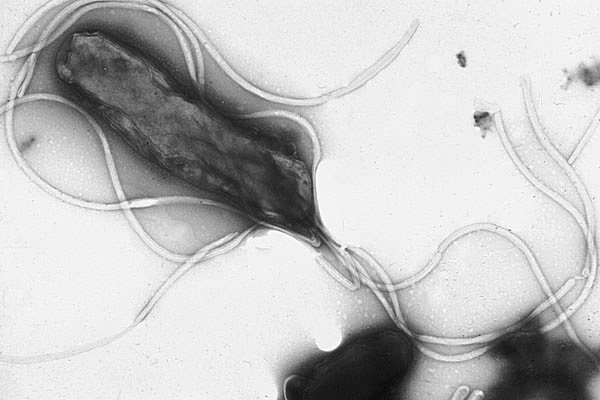 |
This is a file from the Wikimedia Commons. Information from its description page there is shown below.
Commons is a freely licensed media file repository. You can help.
|
Summary
| Description |
العربية: صورة للملتويات البوابية بالمجهر الإلكتروني الماسح يظهر فيها عدد من سياطها.
English: Electron micrograph of H. pylori possessing multiple flagella (negative staining)
日本語: ピロリ菌の電子顕微鏡写真。菌体の後端から伸びた数本の鞭毛は、主にフラジェリンによって構成されている.
Español: Helicobacter pylori visto al microscopio electrónico, mostrando numerosos flagelos sobre la superficie celular.
Svenska: Helicobacter pylori med flageller. Michael Behe hävdar att flageller är irreducibelt komplexa och därför måste vara designade. Evolutionsbiologer har dock presenterat principer för hur flageller kan uppstå genom evolution.
Česky: Helicobacter pylori s bičíky.
Magyar: Helicobacter pylori elektronmikroszkópos felvétele, jól láthatóak a sejtfelszíni ostorok.
|
| Date |
|
| Source |
Yutaka Tsutsumi, M.D. Professor Department of Pathology Fujita Health University School of Medicine
|
| Author |
Yutaka Tsutsumi, M.D. Professor Department of Pathology Fujita Health University School of Medicine |
Permission
( Reusing this file) |
Copyrighted free use
|
Licensing
 |
The copyright holder of this work allows anyone to use it for any purpose including unrestricted redistribution, commercial use, and modification.  Please check the source to verify that this is correct. In particular, note that publication on the Internet, like publication by any other means, does not in itself imply permission to redistribute. Files without valid permission should be tagged with {{subst: npd}}. Please check the source to verify that this is correct. In particular, note that publication on the Internet, like publication by any other means, does not in itself imply permission to redistribute. Files without valid permission should be tagged with {{subst: npd}}.
Usage notes:
• If the work requires attribution, use {{ Attribution}} instead
• If this is your own work, please use {{ Cc-zero}} instead
|
File usage
The following pages on Schools Wikipedia link to this image (list may be incomplete):
This file contains additional information, probably added from the digital camera or scanner used to create or digitize it. If the file has been modified from its original state, some details may not fully reflect the modified file.
SOS Childrens Villages has brought Wikipedia to the classroom. SOS Childrens Villages believes education is an important part of a child's life. That's why we ensure they receive nursery care as well as high-quality primary and secondary education. When they leave school, we support the children in our care as they progress to vocational training or higher education. Have you heard about child sponsorship? Visit our web site to find out.



